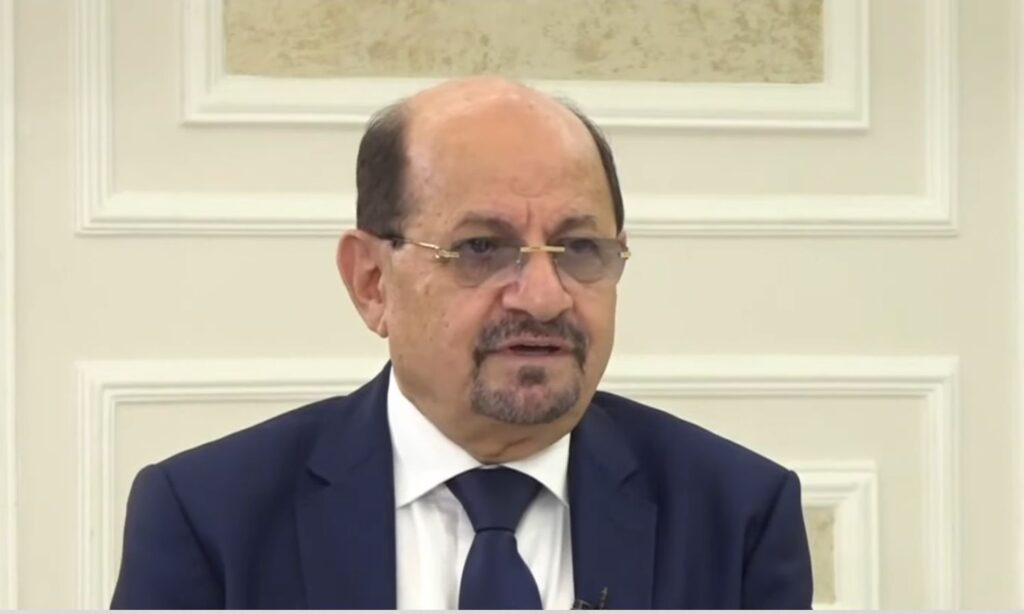Yemen’s Foreign Minister, Shaya al-Zindani, stated that the Syrian regime’s government does not diplomatically recognize the Ansar Allah group (Houthis), despite them having controlled the Yemeni embassy in Syria for several years.
During a recorded interview with Saudi channel Al-Arabiya Al-Hadath on May 11, it was mentioned that the individuals associated with the Houthis at the Yemeni embassy in Damascus, did not receive any diplomatic recognition from the regime.
This statement comes months after an announcement by the legitimate government about taking over the Yemeni embassy in Damascus instead of the previous representative belonging to the Houthis.
Yemen’s former Foreign Minister Ahmed Awad bin Mubarak, told Independent Arabia in October 2023, that he was “officially informed by the Syrian Foreign Minister that they expelled the Houthis from the Yemeni embassy building in Damascus.”
The Syrian regime has not yet commented on the decision to expel the Houthi diplomatic mission in Damascus.
Information so far does not seem to have led to the legitimate government taking over the embassy and appointing an ambassador or a diplomat to represent it in Damascus. Minister al-Zindani said his country is keen to continue efforts to appoint representatives in the Syrian capital, without ruling out the appointment of an ambassador or representative at any level under an agreement with Damascus.
The change in the Syrian stance towards the Yemeni governments dates back to the beginning of signs of resuming relations between the Syrian regime and Saudi Arabia. Riyadh supports the internationally recognized Yemeni government, while Tehran, the ally of the Syrian regime, supports the Houthi group in Yemen.
Iran’s influence
The first meeting of its kind since 2011, between Syria’s Foreign Minister Faisal Mekdad and former Yemeni Foreign Minister Ahmed bin Mubarak, took place in September 2023, despite Damascus not recognizing this government and appointing an ambassador for the Iran-backed Houthis at the time.
Since then, the Syrian regime’s government has not announced any changes in the course of diplomatic relations with Yemen, while Yemen’s Foreign Minister Shaya al-Zindani expects that the regime has evacuated the embassy from the Houthi representatives.
Regarding the unclear stance of the regime towards Yemeni parties, researcher Nader al-Khalil from the Omran Center for Strategic Studies believes that the current Damascus position aligns significantly with Iranian policy, reflecting its mechanisms for seeking clear regional alliances.
Al-Khalil told Enab Baladi that the Syrian stance does not necessarily carry positive intentions towards the legitimate Yemeni government; it is a result of Iranian influence over Damascus.
He added that there is no clear convergence of interests between Damascus and Sanaa on the Arab scene, except that both the Syrian regime and the Houthi group in Yemen are supported by Iran, making them “allies within a regional alliance led by Tehran.”
Iran considers this coordination as an enhancement of its regional influence and a counter to Saudi policies in the region, aiming to use its allies to achieve its strategic and political goals, according to the researcher.
Damascus and Sanaa’s relations: The Riyadh dimension
Yemen was among the countries that objected to any resumption of relations with the regime prior to its reinstatement in the Arab League. The Wall Street Journal reported that at least five Arab League members, including Yemen, opposed the regime’s return to the league.
Also, Sanaa was among the Arab nations that diplomatically boycotted the Syrian regime after 2011, with the relationship worsening between the two countries following the Saudi-led coalition’s intervention in Yemen in March 2015, after the regime sided with the Houthis, and established a diplomatic relationship with the Ansar Allah group, who appointed an ambassador to Damascus in March 2016.
Enab Baladi reached out to the Yemeni Foreign Ministry for a comment on the drastic change in its perspective on the Syrian regime, but had not received a response at the time of this news release.
With the resumption of relations between the regime and Saudi Arabia early last year, Damascus’s relationship with Yemen began to change, but researcher Nader al-Khalil downplayed the significance of this relationship with Riyadh and its impact on Sanaa.
Al-Khalil considered that the regime is trying to present itself as having the leverage to move outside of Iran’s control, aligning with Gulf and Arab aspirations starting with politically calculated openness based on the “step-for-step” principle, and the conditions set for progressing towards it.
However, the researcher excluded the Houthi file from the regime’s attempts to align with Saudi Arabia in regards to Yemen, despite the recent relative closeness between Damascus and Riyadh. He considered that the Syrian stance towards Yemen remains significantly influenced by Iranian policy.
He stated that the regime’s reliance on Iranian military or economic support reduces its flexibility in taking stances opposing Tehran’s interests, including those related to Yemen.
The latest Yemeni statements reflect Damascus’s continued alignment with Iranian policy rather than Saudi Arabia, despite any slight improvement in relations with Riyadh.
Diplomatic fluctuations
The Houthi group previously appointed a leader from the Yemeni Arab Socialist Baath Party (Syria’s wing), Nayef Ahmed al-Qanis, as their ambassador in Damascus, even though the legitimate Yemeni government was present on the scene.
In November 2020, the Houthi group announced the appointment of the journalist Abdullah Ali Sabri as their ambassador in Damascus, replacing al-Qanis. In response, the Yemeni government declared it began pursuing three leaders of the group accused of “impersonating diplomatic roles in Iran and Syria,” including the former ambassadors, as reported by Belqees Yemeni channel.
The Yemeni Foreign Ministry stated at the time, “The judiciary has commenced legal actions necessary to issue coercive arrest warrants against the aforementioned three through Interpol.”
In October 2023, former Yemeni Foreign Minister Ahmed Awad bin Mubarak announced that the Syrian regime’s government handed over its embassy in Damascus back to the legitimate government, replacing the previous representative from the Houthis, but this has yet to be translated into appointing a diplomat from the legitimate government.

